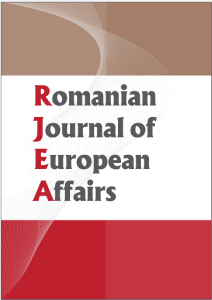În numărul din decembrie al Romanian Journal of European Affairs, autorii articolelor aduc în atenție mai multe subiecte, după cum urmează: aderarea României la zona euro; capitalul de risc și achiziția prin îndatorarea companiei, în Europa de Est; modele de (dis)continuitate în politica europeană a lui David Cameron; discursurile conflictuale privind relațiile UE – Rusia; diferite fațete ale euroscepticismului în Estonia; precum și performanța exporturilor în rândul statelor baltice.
Guest article: Romania’s Euro Area Accession: The Question is Under What Terms!
Daniel Dăianu, Ella Kállai, Gabriela Mihailovici, Aura Socol
Abstract:
Euro area (EA) accession should mainly depend on the achievement of a critical mass of real and structural convergence, which should diminish the risks to operate in an incomplete monetary union. Accession would also be enhanced by reforms in the functioning of euro area institutions and policies which should deal with asymmetric shocks. We argue that the true stake of euro adoption in Romania should be neither “if’’ nor “when”, but “under what terms” and “how it will be done”. The essential prerequisite for real convergence is raising competitiveness. Our analysis shows common problems regarding competitiveness in new member states in terms of infrastructure, institutional development, business sophistication, innovation; it points out the scale of risks attached to a premature euro area accession. This accession does not require the achievement of the euro area average level of GDP/capita (in PPP terms). As we argue, one can imagine Romania’s accession after having achieved a minimum of 75% of euro area GDP/capita average and the fulfilment of a series of structural conditions against the backdrop of euro area reforms.
Keywords: Euro area accession, real convergence, structural convergence, Euro area sustainability, integration degree
Venture Capital and Leveraged Buyout: What Is the Difference in Eastern Europe? – A Cross-Country Panel Data Analysis
Mihai Precup
Abstract:
The aim of this paper is to compare the determinants of leveraged buyout activity, respectively venture capital activity in Eastern European countries. Additionally, this paper presents the main highlights in terms of evolution of leveraged buyout investments and venture capital investments during the recent crisis in the European emerging countries. The panel data analysis used in this paper will include determinants consecrated in previous studies such as GDP growth, market capitalization or R&D expenditures, as well as new variables such as productivity and corruption index. In order to estimate a panel data model with fixed and random effects, we collected data on leveraged buyout activity, respectively venture capital activity in Eastern European countries over the period 2000-2013. This paper will follow the methodology developed by Gompers and Lerner (1998), Jeng and Wells (2000), Romain and de La Potteria (2004), Félix (2007) and Bernoth and Colavecchio (2014). The present research paper shows that the LBO and the venture capital are differently affected by macroeconomic conditions. Based on our empirical results, we have pointed several strategic directions that are meant to support the development of the leveraged buyout and venture capital markets in Eastern Europe.
Keywords: Leveraged buyout, venture capital, market capitalization, unemployment rate, corruption, Eastern Europe
The Same Ol’ Story…or Not? Patterns of (Dis)continuity in David Cameron’s European Policy
Monika Brusenbauch Meislová
Abstract:
With its profound implications, Brexit is set to be the defining issue for the United Kingdom (UK) and one of the most unique challenges that the European Union (EU) and its member states have ever faced. It was under the premiership of the former Prime Minister David Cameron that Britain’s relationship with the EU took such a dramatic turn. As it is essential, now more than ever, to understand the intriguing issue of Cameron’s European legacy, this article aims to deepen our understanding of his EU policy and provide key insights into the logic of his European dilemmas. As such, it explores how Cameron’s EU policy evolved under his Conservative Party leadership and investigates patterns of continuity and discontinuity in his EU discourse. More specifically, the inquiry compares three stages of Cameron’s EU policy corresponding with his three cabinets 1) shadow cabinet (2005-2010); 2) first cabinet (Cameron–Clegg coalition; 2010-2015); and 3) second cabinet (single-party ministry; 2015-2016). In each of these stages, attention is primarily given to trends, hallmarks and strategies of his European policy. The article concludes that whilst continuity can be detected in David Cameron’s EU policies throughout the whole tenure of his Conservative Party leadership, his EU strategies and tactics were marked by substantial discontinuity.
Keywords: David Cameron, European policy, in/out referendum, Brexit, dis(continuity)
The Clash of Discourses Regarding Relations with Russia: New Fault Lines in the European Union?
Valentin Naumescu
Abstract:
Following the annexation of Crimea and the secession war in Eastern Ukraine, the topic of European security has returned as a major benchmark for a number of EU and non-EU countries. For a couple of years, in 2014-2015, the discourse of condemnation and international sanctions against the Russian regime dominated the agenda of the European-Russian relations. Nevertheless, the economic considerations and the ascension of right-wing or left-wing populism(s) in the European Union acted as a drag on European unity and solidarity. Thereby a series of political leaders in the EU and its Eastern Neighbourhood began to ask for economic rapprochement with Russia, while others remained very cautious. Based on a comparative qualitative method, this paper explores the clashing discourses about relations with Russia, in light of the discourse theory. The dynamics of divergent positioning regarding Russia after 2016 led to the question of possible new fault lines in the European Union. Inconsistencies on this topic can be seen between West and East, between post-communist countries on the Eastern Flank with Poland, Romania and the Baltic States, on one side, and Hungary, Bulgaria, Slovakia and the Czech Republic on the other side, and between Western chancelleries with rather different views such as Berlin, London or Rome. The aim of this article is to explore the increasing differences and clarify whether conflicting approaches regarding relations with Russia could create real cleavages between EU Member States and threaten European unity.
Keywords: European Union, EU-Russia relations, Eastern Neighbourhood, discourse, populism
Opposing the European Union or looking for more reforms: different facets of Euroscepticism in Estonia
Viljar Veebel
Abstract:
Although public support for EU membership is strong in Estonia, some Eurosceptic views are also expressed. Most of the agents and groups with Eurosceptic views could be classified as soft Eurosceptics, including some politicians and public figures. However, from time to time Euro-populist ideas combined with hard Euroscepticism have emerged too, mostly among the politicians, but their overall influence in society is rather modest today. Nevertheless, as regards the economic perspective, the Eurosceptic views and arguments in Estonia are often based on pure economic rationality, which could in principle refer to the origins of “Euro-pragmatism” in Estonia. Thus, a “positive program” is needed where the focus is not on the statements like “we do not need Eurosceptics”, but on the question of how Eurosceptics could contribute to a more sustainable European Union.
Keywords: Euroscepticism, Estonia, European Union, public opinion
Export Performance of the Baltic States: The Effects of the Aid for Trade Initiative
Beáta Udvari
Abstract:
As a result of the global economic crisis and the situation in the EU, as well as that of the Russian-Ukraine conflict, the Baltic exports have decreased toward these countries, while there is a slight increase in exports to other regions, mainly to Asia, meaning that Asian developing countries have gained larger share in the trade of the Baltic countries. Nevertheless, the trade performance of EU members is also influenced by several EU policies directly or indirectly. Regarding the European development policy, the Aid for Trade (AfT) initiative has a crucial role in helping developing countries to participate in international trade more effectively. It is shown that AfT assistance provided by the EU generally increases the trade volume between the EU and the recipient countries; however, there is no information on how this increase is distributed among EU member states. Consequently, this paper aims to respond to the question of how AfT influences the trade performance of the Baltic states. The research is based on an empirical investigation, by applying a gravity model. The results show that Aid for Trade provided by the EU to developing countries has no significant impact on the exports of the Baltic countries.
Keywords: Aid for Trade, export performance, Baltic countries






